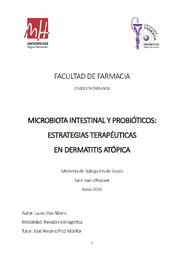Please use this identifier to cite or link to this item:
https://hdl.handle.net/11000/32640Microbiota intestinal y probióticos: estrategias terapéuticas en dermatitis atópica
| Title: Microbiota intestinal y probióticos: estrategias terapéuticas en dermatitis atópica |
| Authors: Díaz Albero, Laura |
| Tutor: Picó Monllor, José Antonio |
| Editor: Universidad Miguel Hernández |
| Department: Departamentos de la UMH::Farmacología, Pediatría y Química Orgánica |
| Issue Date: 2024-05-23 |
| URI: https://hdl.handle.net/11000/32640 |
| Abstract: Introducción: La dermatitis atópica es uno de los problemas dermatológicos más comunes. A pesar de ello, el tratamiento convencional presenta una serie de inconvenientes como efectos adversos significativos y respuestas subóptimas. Tras la evidencia de la existencia de una correlación entre la piel y el intestino, “eje-intestino-piel”, y la influencia de ésta en el desarrollo y gravedad de enfermedades inflamatorias de la piel como la DA, a través de desequilibrios en la microbiota intestinal, surge la hipótesis del uso de probióticos como posible estrategia terapéutica dada su capacidad de modulación del sistema inmunológico por medio de la regulación de la diversidad microbiana, evaluándose su eficacia mediante la reducción de la gravedad de esta patología. Objetivos: Estudiar la eficacia terapéutica de la suplementación probiótica como tratamiento alternativo en la reducción de los síntomas y signos de la dermatitis atópica. Material y métodos Se realiza una revisión bibliográfica con la finalidad de reunir evidencias científicas sobre el uso de probióticos en dermatitis atópica para su posterior estudio descriptivo y análisis crítico. Los datos se obtuvieron de la consulta directa y acceso, vía internet, de las bases de datos bibliográficos del ámbito de ciencias de la salud: MEDLINE (vía PubMed), Scopus, Embase y The Cochrane Library. La ecuación de búsqueda final se realizó mediante la utilización de los descriptores "probiotics", "Dermatitis, Atopic" y “treatment outcome” tras su búsqueda en el DeCS, la utilización de conectores booleanos y la aplicación del filtro “clinical trial”. Resultados: Se recuperaron un total de 220 artículos de los que, tras la aplicación de los criterios de inclusión y exclusión establecidos se aceptaron 17 para su revisión detallada. Se evaluó la calidad de los diferentes estudios empleando la guía de estudios observacionales CONSORT, obteniendo una media de 18 puntos sobre un máximo de 25. Conclusión: a pesar de algunas disconformidades y limitaciones metodológicas, la evidencia acumulada apoya de forma mayoritaria el uso de probióticos como una estrategia terapéutica eficaz en el tratamiento de la DA. Sin embargo, es necesario realizar más estudios con diseños robustos y metodologías transparentes para confirmar estos hallazgos y comprender mejor los mecanismos subyacentes. Introduction: Atopic dermatitis is one of the most common dermatological problems. Despite this, conventional treatment presents a series of drawbacks such as significant adverse effects and suboptimal responses. Following the evidence of the existence of a correlation between the skin and the intestine, “gut-skin axis”, and the influence of this on the development and severity of inflammatory skin diseases such as AD, through imbalances in the intestinal microbiota, the hypothesis of the use of probiotics as a possible therapeutic strategy arises given its capacity to modulate the immune system through the regulation of microbial diversity, evaluating its effectiveness by reducing the severity of this pathology. Objectives: To study the therapeutic efficacy of probiotic supplementation as an alternative treatment in reducing the symptoms and signs of atopic dermatitis. Material and methods: A bibliographic review was carried out with the aim of gathering scientific evidence on the use of probiotics in atopic dermatitis for subsequent descriptive study and critical analysis. The data were obtained from direct consultation and access, via the Internet, to bibliographic databases in the field of health sciences: MEDLINE (via PubMed), Scopus, Embase and The Cochrane Library. The final search equation was carried out by using the descriptors "probiotics", "Dermatitis, Atopic" and “treatment outcome” after searching in the DeCS, the use of Boolean connectors and the application of the “clinical trial” filter. Results: A total of 220 articles were recovered, of which, after applying the established inclusion and exclusion criteria, 17 were accepted for detailed review. The quality of the different studies was evaluated using the CONSORT observational studies guide, obtaining an average of 18 points out of a maximum of 25. Conclusion: despite some disagreements and methodological limitations, the accumulated evidence mostly supports the use of probiotics as an effective therapeutic strategy in the treatment of AD. However, further studies with robust designs and transparent methodologies are needed to confirm these findings and better understand the underlying mechanisms |
| Keywords/Subjects: Microbiota intestinal Dermatitis atópica Eczema Probióticos Simbióticos Suplementos alimenticios eficacia SCORAD |
| Knowledge area: CDU: Ciencias aplicadas: Medicina: Farmacología. Terapéutica. Toxicología. Radiología |
| Type of document: info:eu-repo/semantics/bachelorThesis |
| Access rights: info:eu-repo/semantics/openAccess Attribution-NonCommercial-NoDerivatives 4.0 Internacional |
| Appears in Collections: TFG - Farmacia |
.png)

